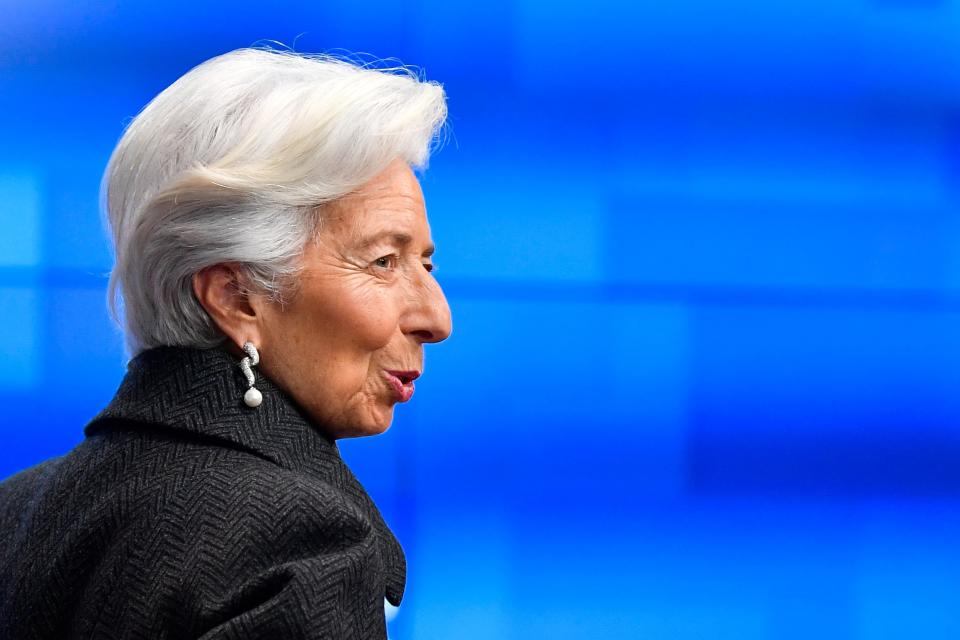Measuring COVID-19's economic impact will have to wait: Morning Brief
Tuesday, March 3, 2020
Get the Morning Brief sent directly to your inbox every Monday to Friday by 6:30 a.m. ET. Subscribe
Recent U.S. economic data is measuring a time before coronavirus
Economic data is always reported on a lag.
This is not a new challenge for investors to navigate.
But what is new are questions about how COVID-19 might slow down the global economy.
And the challenge now facing investors will be wading through upcoming rounds of economic data that aren’t likely to offer many insights into how much damage the coronavirus is inflicting on the U.S. economy for another month.
Manufacturing data released Monday from both the Institute for Supply Management and IHS Markit showed the U.S. economy expanded modestly last month. But neither of these reports seemed to capture any of the COVID-19 fears expressed by financial markets last week.
IHS Markit’s PMI reading published Monday came in at 50.7, indicating modest expansion in the manufacturing sector last month. This data was collected between February 12-24, however, a period just before COVID-19 fears began to crescendo.
Chris Williamson, the chief business economist at IHS Markit, said Monday that, “companies have become increasingly concerned that the COVID-19 outbreak will also hit demand, which is reportedly already cooling amid uncertainly leading up to the presidential election.”
Similarly, the ISM’s February manufacturing index published Monday hit 50.1, also indicating a modest expansion in economic activity last month. Several respondents to the ISM’s survey mentioned the coronavirus, but mentioned COVID-19 largely as a potential supply chain risk that will need to be mitigated in the months ahead.
Financial markets, however, have clearly skipped ahead and indicated more serious challenges face global growth.

“The [ISM] survey clearly doesn’t capture the more recent concerns about the coronavirus and already appears to be being dismissed as old news by the markets,” said Andrew Hunter, senior U.S. economist at Capital Economics, said Monday.
“Overall, the ISM index broadly supports the other manufacturing surveys in suggesting that while the coronavirus lockdown in China was starting to have a knock-on impact on US firms via supply chain disruption, that hit has so far been relatively modest,” Hunter added.
“But with the virus continuing to spread around the world and a more serious outbreak within the U.S. now looking increasingly likely, the disruption is likely to worsen over the coming weeks.”
And initial looks at how COVID-19 has hampered global economic activity aren’t good.
Chinese manufacturing data for February released over the weekend was the worst on record, with the government’s official PMI reading tumbling to 35.7. In 2008, this measure of economic output bottomed at 38.8. Any reading below 50 indicates contraction while readings over 50 indicate growth.
JPMorgan’s global manufacturing PMI for February fell to 47.2, the lowest level since 2009 though most of last month’s decline was due to the horrific numbers coming out of China. Manufacturing data for the U.S. in February, in contrast, indicated a modest expansion in economic activity last month.
These are the kinds of readings markets are clearly braced to see across the developed world.
But upcoming readings on the monthly jobs report, retail sales, and inflation are all likely to offer snapshots of an economic point in time in which the COVID-19 story was dramatically different. Rarely have been reports been so dated, so quickly.
Which means investors will be flying blind until April before they can get a real sense of how COVID-19 might crimp economic growth here in the U.S.
Of course, by then it’ll all be old news.
By Myles Udland, reporter and co-anchor of The Final Round. Follow him at @MylesUdland
What to watch today
Economy
Wards Total Vehicle Sales, February (16.80 million expected, 16.84 million in January)
Earnings
Pre-market
6:30 a.m. ET: Target (TGT) is expected to report adjusted earnings of $1.66 per share on $23.44 billion in revenue
Post-market
4:05 p.m. ET: Nordstrom (JWN) is expected to report adjusted earnings of $1.47 per share on $4.53 billion in revenue
From Yahoo Finance
Read our coverage ahead of Super Tuesday and this evening tune in at 5 p.m. ET for live special coverage of Super Tuesday hosted by Yahoo Finance, Yahoo News and HuffPost.
'Unique experience with wealthy candidates': Why Bloomberg will have a tough time in California
2020 candidates are 'dumbfounded’ on how to end homelessness: LA Mission CEO
A close Biden advisor to the rest of the field: ‘It is time to consolidate’
California elections chief to voters: 'Don't believe everything you read...on Facebook'
Top News

Stocks jump ahead of emergency G7 coronavirus call [Yahoo Finance UK]
Thermo Fisher launches $12 billion bid for Qiagen [Reuters]
Berkshire boosts Delta Air stake by $45 million amid market rout [Bloomberg]
YAHOO FINANCE HIGHLIGHTS
‘We’ll have the first global cyber warfare this year’: Nouriel Roubini
—
Follow Yahoo Finance on Twitter, Facebook, Instagram, Flipboard, SmartNews, LinkedIn, YouTube, and reddit.
Find live stock market quotes and the latest business and finance news
For tutorials and information on investing and trading stocks, check out Cashay


